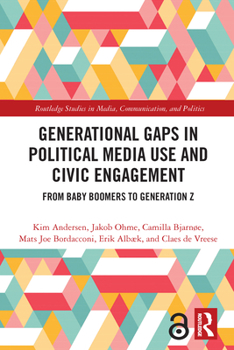Generational Gaps in Political Media Use and Civic Engagement: From Baby Boomers to Generation Z
Select Format
Select Condition 
Book Overview
This book investigates news use patterns among five different generations in a time where digital media create a multi-choice media environment.
The book introduces the EPIG Model (Engagement-Participation-Information-Generation) to study how different generational cohorts' exposure to political information is related to their political engagement and participation. The authors build on a multi-method framework to determine direct and indirect media effects across generations. The unique dataset allows for comparison of effects between legacy and social media use and helps to disentangle the influence on citizens' political involvement in nonelection as well as during political campaign times. Bringing the newly of-age Generation Z into the picture, the book presents an in-depth understanding of how a changing media environment presents different challenges and opportunities for political involvement of this, as well as older generations.
Bringing the conversation around political engagement and the media up to date for the new generation, this book will be of key importance to scholars and students in the areas of media studies, communication studies, technology, political science and political communication.





